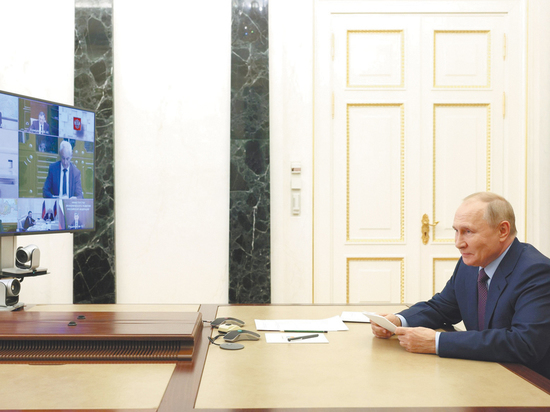Putin acknowledged disputes in the government about the “airbag”
[ad_1]

Having abandoned dollars and euros, it is hardly worth saving yuan
Vladimir Putin acknowledged the existence of disputes within the financial and economic bloc during the formation of the 2023 budget. The stumbling block, despite the changed situation, is still the same – to save or spend. “What is a “safety cushion” in modern conditions and how to create it,” the President outlined the key problem of the Cabinet of Ministers. Earlier, his assistant Maxim Oreshkin criticized the intention of the Ministry of Finance to create state reserves in yuan and currencies of other friendly countries, urging “not to look for a good uncle in the East” and invest more in the Russian economy.
The final touches are being made to the 2023 budget. This week, the main financial document should be approved at a government meeting and submitted to the State Duma, so on Monday the president gathered officials to settle the remaining differences. The head of the Ministry of Finance, Anton Siluanov, previously admitted that the budget for the upcoming three-year period turned out to be the most difficult in his professional career (spending has increased, and money, given the known limitations, is difficult to find). However, the authorities do not consider the transition to a mobilization economy even speculatively. Vladimir Putin stressed at the meeting that the 2023 budget should remain a “development budget.” This, according to him, is an unconditional priority.
The new financial plan, Putin said, must be drafted in such a way that it ensures the implementation of national projects, creates conditions for the restructuring of the economy and the implementation of large technological and infrastructure projects, and also maintains macroeconomic stability and sustainability. “This basic document should fully meet both our priorities and the challenges we face,” the president said, noting that so far the Cabinet has been able to cope with the tasks set. The Russian economy successfully withstands the “financial and technological aggression” of the collective West, and the budget feels “significantly better” than the budgets of most G-20 and BRICS countries. This margin of safety, according to the GDP, allows the authorities not only to “react to unfriendly steps”, but also to consistently solve their development tasks in the economy, social sphere and infrastructure.
At the same time, Putin acknowledged the existence of disputes within the financial and economic bloc on the subject of “what to pay more attention to”, where to direct more funds – into investments or into the creation of a “safety cushion”. “How to create it in the new conditions and what is a “safety cushion” when we have a well-known and inevitable process of de-dollarization,” the GDP’s main stumbling block was identified. A few days before, the existing contradictions had already splashed out to the public in the form of a discussion between the head of the Ministry of Finance, Anton Siluanov, who advocated updating the budget rule and forming a “safety cushion” through investments in gold, yuan and the currencies of other friendly countries, and presidential aide Maxim Oreshkin, which advocates investment in the Russian economy. “The dollar and the euro should be exchanged for rubles and not for other currencies. We need to build a system where we primarily depend on ourselves and invest in ourselves,” Oreshkin believes.
Russian officials and Putin himself call the “airbag” primarily the National Wealth Fund (NWF): as of September 1, its reserves amounted to 11.8 trillion in ruble equivalent. The government abandoned dollars in the structure of the fund last year, and now they are trying to reduce the share of other “toxic currencies” – the euro, British pounds and Japanese yen. The yuan already accounts for 17% of reserves ($100 billion) – in the future, the purchase of Chinese currency is planned to be carried out as part of the updated budget rule, which proposes to revive the Ministry of Finance with the onset of SVO). Such a policy, firstly, does not change anything strategically: as they put money in a jar, they will add it up. Secondly, it creates the risk of financial dependence of the Russian Federation now on China. If the euro and the dollar are freely convertible currencies, then Moscow will have to obtain special permission from Beijing to sell its holdings of yuan.
Newspaper headline:
“Airbag” can become ruble
[ad_2]
Source link






